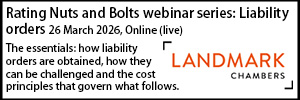High Court rules for first time on water neutrality
- Details
The High Court has dismissed the first challenge to an Inspector’s decision which refused planning permission for a development on grounds of water neutrality. Matt Lewin explains why.
In September 2021, Natural England issued guidance for all development within the Sussex North Water Supply Zone, an area covering a significant part of southern England, being the whole of the administrative areas of Horsham District Council, Crawley Borough Council and parts of the areas of Chichester District Council, the South Downs National Park and West Sussex County Council.
The Natural England guidance stated that it could not be concluded that existing water abstraction within the water supply zone was not having an impact on the Arun Valley SPA, SAC and Ramsar Site. Therefore developments within the zone could not add to this impact and one way of achieving this was to demonstrate “water neutrality”.
Water neutrality is achieved where the use of water in the supply zone before the development is the same or lower after the development is in place.
The claimants in Ward v Secretary of State for Housing, Communities and Local Government [2024] EWHC 1780 (Admin) had applied for planning permission for a mobile home and stable block at a site in Horsham in 2018. That application was refused in 2019 and appealed.
In December 2020 (around 9 months before the Natural England guidance was published), the claimants moved onto the site in breach of planning control.
Following the publication of the Natural England guidance in September 2021, the claimants were required to submit a water neutrality statement. Their argument was simple: as they had been residing on the site (and consuming water) prior to the “base date” of the Natural England guidance, granting planning permission for residential use of the site would not result in any additional water consumption above the status quo.
Natural England were consulted on the appeal and advised that only development which had been granted planning permission or which was “otherwise accounted for” was exempt from the requirement to demonstrate water neutrality.
The Inspector, in dismissing the appeal, concluded, in light of Natural England’s consultation response, that only water usage associated with lawful development (i.e. development with the benefit of planning permission or which was immune from enforcement action) was exempt from the requirement to demonstrate water neutrality.
The claimants challenged the Inspector’s decision on water neutrality on two principal grounds:
- that he had been wrong to find that only lawful development was exempt from the requirement to demonstrate water neutrality; and
- having otherwise found the development to be acceptable in planning terms, he should have placed the appeal in abeyance until a strategic mitigation solution had come forward.
However, Dan Kolinsky KC, sitting as a Deputy High Court Judge, rejected both of these arguments. He held:
- The Inspector’s conclusion that “otherwise accounted for” was akin to “immune from planning control” was a lawful exercise of his planning judgment as the competent authority [59].
- The proposal to put the appeal into abeyance had not been articulated with sufficient clarity for the Inspector to have addressed in the decision letter. There was no indication as to how long the period of abeyance should be, what should happen if no strategic mitigation materialised or circumstances otherwise changed during the period of abeyance or how the rationale for placing the appeal into abeyance would be explained to the parties [72]. Accordingly, the Inspector’s failure to address the request to place the appeal in abeyance was not unlawful [78].
The claim was also rejected on a third ground, which was related to the possibility of a split permission (i.e. granting planning permission for part of the proposed development).
Here the court held that no clear request had been made for a split permission, despite the claimants having been represented by an experienced planning consultant. In the absence of a clear request, earlier authority is clear that an inspector has no obligation to consider a split permission [100].
Permission to appeal was refused.
Read the judgment here.
Matt Lewin, a member of Cornerstone Barristers’ Planning and Environment Team, represented the Secretary of State for Housing, Communities and Local Government. He is a member of the Attorney General’s panel of counsel.
Sponsored articles
Unlocking legal talent
Walker Morris supports Tower Hamlets Council in first known Remediation Contribution Order application issued by local authority
Senior Solicitor - Property
Legal Officer
Legal Director - Government and Public Sector
Locums
Poll














































